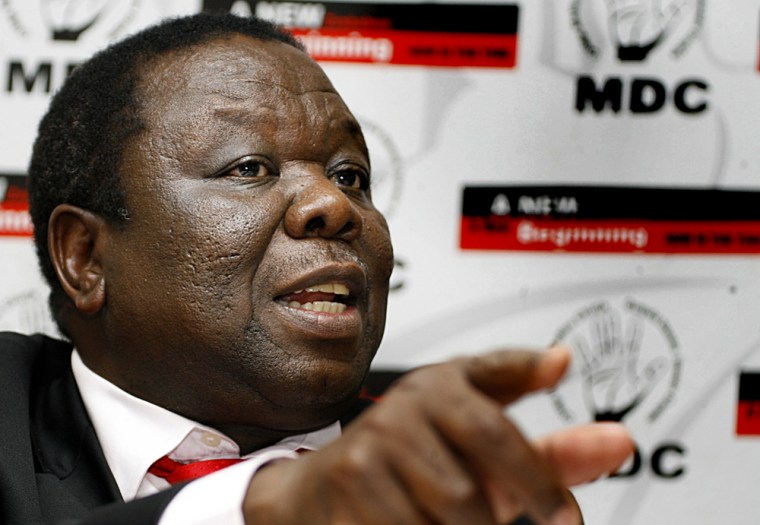Zimbabwe's main opposition will join a unity government early next month, the party's leader said Friday, offering hope the country's leaders can turn to addressing a humanitarian catastrophe.
Earlier this week, Morgan Tsvangirai's Movement for Democratic Change had rejected a recommendation from regional leaders that the coalition agreement stalled since September be implemented in early February. The reversal came amid speculation President Robert Mugabe would form a government on his own if the opposition did not come aboard.
"We met and we have decided to abide" by the regional leaders' resolution, Tsvangirai told reporters after a high-level party meeting Friday. "We are committed to joining the government of national unity and hope that (Mugabe party officials) are going to treat us as equal partners."
The opposition had resisted joining a coalition with Mugabe until a dispute over how to fairly share Cabinet posts was resolved after Mugabe insisted on keeping the most powerful posts for his ZANU-PF party. The opposition also wanted attacks on dissidents to stop before it enters into the unity government first agreed to in September.
Mugabe's party and leaders of neighboring countries have said the opposition should first enter the government, then resolve outstanding issues. With Friday's decision, the opposition appears to have adopted that strategy.
After an all-night summit, the main regional grouping on Tuesday had called on Zimbabwe's factions to swear in a prime minister, the post Tsvangirai is to hold in the unity government, on Feb. 11. Mugabe, in power in the southern African country since its independence from Britain in 1980, was to remain president.
Some of Tsvangirai's allies say he never should have agreed to serve as prime minister in a government that left Mugabe as president. Mugabe, meanwhile, was under pressure from aides in the military and government who don't want to give up power and prestige to the opposition.
Growing humanitarian crisis
The threat of being frozen out of government by Mugabe and pressure from neighboring countries may not have weighed as heavily on the opposition as a sense that their country was in urgent need of a political solution so it could address a growing humanitarian crisis.
The United Nations said Friday cholera has sickened 60,401 Zimbabweans and killed 3,161 since August. Experts believe many more have been sickened without being counted because so few Zimbabweans are able to get to hospitals.
Experts had predicted the crisis would peak at 60,000 cases, but Elisabeth Byrs, a spokeswoman for the U.N. humanitarian affairs agency, said Friday: "Unfortunately, the outbreak is not under control yet."
Up to 80 percent in need of aid
The collapse of Zimbabwe's health and sanitation infrastructure under the weight of hyperinflation has made it difficult to contain cholera. Humanitarian groups also are battling a hunger crisis. The U.N. food program said Thursday that 7 million Zimbabweans — 80 percent of the population by some estimates — need food aid.
Dr. Dominique Legros, a cholera expert with the World Health Organization, said the health system in Zimbabwe was unable to cope with the crisis because staff can't afford to go to work.
A government decree Thursday allowing business to be done in foreign currency might ease the problem, he said.
"The local currency depreciates so fast that they can't even pay their fare to get to work. If they can be paid in foreign currency, then it's a very important progress," he told The Associated Press Friday.
Cholera spreads to countryside
From a medical point of view, the most pressing need was to make oral rehydration salts widely available in rural areas. Cholera has spread from the cities to the countryside in recent weeks, claiming many lives among those unable to reach health centers in time because of lack of funds for or access to transport.
"We made the earlier prediction (of 60,000 cases) based on the assumption that half the population was at risk," Legros said. "We considered that the absolute worst-case scenario based on our experience in other countries."
"But making a prediction today is really very difficult," he added, because the number of infections is still rising week on week.
"If we don't get that further intensification of efforts then there is no way we can get it under control. It will become endemic and we will have thousands of cases every week without end."
Legros offered one glimmer of hope that the outbreak may eventually be brought under control.
The case fatality rate has been declining in recent weeks, meaning more people are surviving the disease. Still, at the moment about 1 in every 25 cases ends in death.
"It should be below 1 percent," said Legros.
